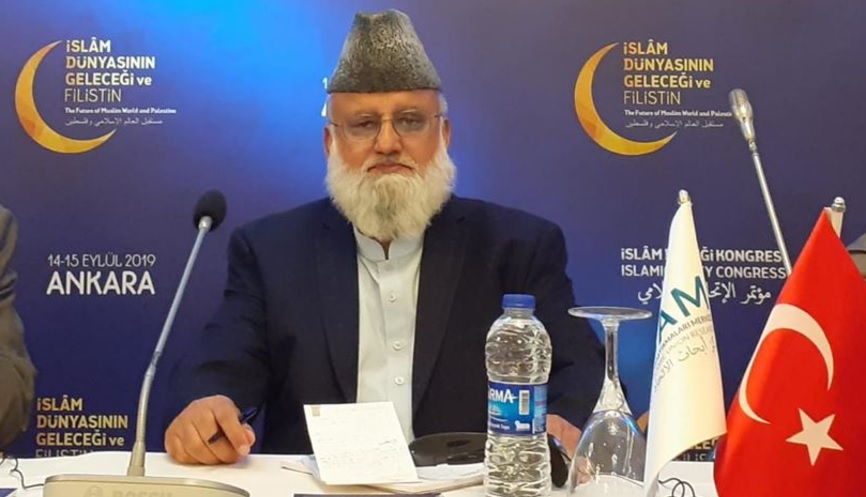Kashmiri lawmaker urges Erdogan to raise Kashmir at UN
'If Muslim countries act, India won’t oppress Kashmiris', chairman of Muzaffarabad-based All Parties Kashmir Council says- Anadolu Agency
- 23 September 2019, 07:16

Kashmiris have a lot of expectations from Turkish President Recep Tayyip Erdogan, a Kashmiri lawmaker said urging the Turkish state to raise Kashmir issue at the upcoming UN General Assembly session, Anadolu Agency report said
Talking to Anadolu Agency, Azad Kashmir lawmaker Abdul Rashid Turabi said that Erdogan has played a "good role" on Kashmir at the Organization of Islamic Cooperation (OIC) and at UN levels.
"When President Erdogan visited India, he also talked about Kashmir," he said referring to state visit of the Turkish president to India in 2017.
The Himalayan region has been under a near-complete lockdown since Aug. 5, after India scrapped its special status, with the government blocking communication access and imposing restriction on movement to thwart any protests in the region.
"At this point of time, we expect President Erdogan to lead and mobilize the OIC Contact Group on Jammu and Kashmir besides calling for special session of OIC or its foreign ministers to discuss the humanitarian crisis in Indian-administered Kashmir," Turabi told Anadolu Agency on sidelines of "Islamic Unity Congress" in Ankara.
Turabi, who is also chairman of All Parties Kashmir Council based in Muzaffarabad, urged Turkish president to talk about the ongoing crisis in Indian-administered Jammu and Kashmir "in view of the official stance of Turkey and OIC".
"President Erdogan should raise the issue of impeding crisis in the region the way India is threatening [and] raising war hysteria. Pressure has to be built on the UN to act so that the crisis is averted and for that Turkey will have to speak on the issue in the UNGA [United Nations General Assembly]," he said.
Several rights groups including Human Rights Watch and Amnesty International have repeatedly called on India to lift restrictions and release political detainees.
India has said that 93% restrictions have been eased in the conflict-ridden region, a claim that Anadolu Agency could not verify independently.
'If Muslim countries act'
Lambasting those Muslim rulers who have reportedly said that "Kashmir is not a Muslim Ummah" issue, Turabi said: "[But] what India is doing in Kashmir is because Kashmiris are Muslims".
He said that it was not just Kashmir "but even inside India there is no safety for Muslim population".
"Muslim rulers need to do something to counter the international agenda of RSS," he said referring to Rashtriya Swayamsevak Sangh -- the fountainhead of ruling Bharatiya Janata Party (BJP) in India.
"They [Muslim rulers] should tell India in clear terms to stop oppression in Kashmir and fulfill the promises made with Kashmiris," Turabi said referring to Muslim-majority Gulf nations which host millions of Indian workers who send huge remittances to their country.
Turabi said that OIC in 1990s passed a resolution that "if India did not stop its excesses in Kashmir, the Muslims countries can review their diplomatic and trade relations with India".
"In view of this OIC resolution, if Muslim countries act, India can never dare to do what it is doing in Kashmir," he said.
Appeal to OIC members
Turabi appealed the OIC representatives attending the upcoming UNGA to "at least speak on Kashmir in view of the statements issued by the OIC and the UN since Aug. 5."
"Endorsing statements made by OIC and UN will build pressure on India to end oppression in Kashmir," he said. "Muslim rulers should rise above their differences and take this historic opportunity to support the Kashmir cause".
Fear of 'demography change'
Turabi alleged that by removing Article 35A "BJP plans to change demography" of Jammu and Kashmir.
"BJP fought elections on the same issue," he said.
"By killing Muslims, settling non-locals including West Pakistan refugees, RSS men, and retired [Indian] army soldiers, build townships for them, they [BJP] want to change the demography of the region," he said fearing that it will lead to "more civilian strife".
Linking Kashmir to settler colonialism in Palestine, Turabi said: "Issue of Palestine is about our faith [but] Kashmir is even dangerous [issue] than that".
"Why? Because, the population of Jews all over the world is not that much and all of them are not in favor of Israel and it is only Zionists who want to settle in Palestinian lands," he said.
Turabi added: "But the Hindu, RSS mindset is more than 1 billion. They are mobilizing even the Hindu minorities on this ideology, which makes it [India] a big dangerous storm for Kashmir, which makes it more dangerous than Palestinian issue when it comes to demography".
From 1954 until Aug. 5, 2019, Jammu and Kashmir enjoyed special status under the Indian constitution, which allowed it to enact its own laws. The provisions also protected the region's citizenship law, which barred outsiders from settling in and owning land in the territory.
Also, the Indian government further downgraded and divided the disputed region into two centrally controlled "union territories".
India and Pakistan both hold Kashmir in parts and claim it in full. China also controls part of the contested region, but it is India and Pakistan who have fought two wars over Kashmir.
Kamruzzaman
More News
-
- ৫ঃ ৪০
- খেলা
-
- ৫ঃ ৪০
- খেলা

